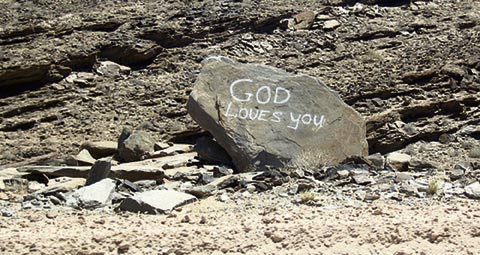May 27 | ![]() 0 COMMENTS
0 COMMENTS ![]() print
print

Always keep in mind that Our God is a loving God
— RONALD ROLHEISER
God is non-violent. God does not prescribe violence. Violence should never be rationalised in God’s name. That is clear in Christian revelation. But that immediately poses the question: What about the violence in scripture that is attributed to God or to God’s direct orders?
Doesn’t God, in anger, wipe out the entire human race, save for Noah and his family? Doesn’t God ask Abraham to kill Isaac on an altar of sacrifice? Doesn’t Moses have to talk God out of destroying Israel because God is angry? Didn’t God give an order to Israel to kill everybody and everything (men, women, children, and even the animals) as she entered the Promised Land? Didn’t the Mosaic Law, attributed to God, prescribe stoning women to death for adultery? Didn’t Jesus kick over the tables of the money-changers in anger? And what about all the wars and capital punishment that have been done in God’s name through the centuries? What about extremist Islam today, killing thousands of people in God’s name?
God, it seems, has prescribed and sanctioned a lot of violence and killing from ancient time right down until today. How do we explain all the violence attributed to God?
Two things need to be kept in mind. Firstly, whenever scripture speaks about God as being offended, as getting angry, as wanting to wreak vengeance on His enemies, or as demanding that we kill somebody in his name, it is speaking anthropomorphically, that is, it is taking our own thoughts, feelings, and reactions and projecting them into God. We get angry, God doesn’t. Our hearts crave vengeance, God’s heart doesn’t. We demand that murderers be executed, God doesn’t. Scripture contains a lot of anthropomorphisms that make for a bad and a dangerous theology if read and understood literally. To read parts of scripture literally is to turn God into a tribal God in competition with other gods.
When scripture says that we experience God’s wrath when we sin, it doesn’t want us to believe that God actually gets angry and punishes us. There’s no need. The punishment is innate, inherent in the sin itself. When we sin it is our own actions that punish us (the way excessive use of alcohol dehydrates the brain and the dehydration causes a headache). We may feel that the punishment as coming from God, from God’s anger, from God’s wrath, but it is nature’s wrath and our own that we are feeling. God has no need to extrinsically punish sin because sin already punishes itself. Nature is so constructed. There is a law of karma. Sin is its own punishment.
But at the level of feeling, this is felt as if God is punishing us. However, as Jesus shows in forgiving His own killers and forgiving everyone who betrayed Him, God forgives sin. God has no need for vengeance or for a justice that extracts a pound of flesh for a pound of sin. Nature already does that. Indeed, given a proper understanding of God’s nature and transcendence, it is presumptuous on our part to even believe that we can ‘offend’ God.
More important still, the biblical texts that attribute violence to God are also archetypal, namely, they are texts that teach us things about the deep rhythms of the human heart but are not meant to be taken literally. Taken literally, they are often the very antithesis of the revelation of God.
But still what do we do with the biblical texts that prescribe violence to God? For instance, how can we interpret God’s ordering Israel to kill all the Canaanites as she entered the Promised Land?
In archetypal stories, killing is metaphorical not literal. It is about a death inside the heart. God’s command to kill all the inhabitants of Canaan is simply a hard metaphor for what Jesus refers to when He says that you have to put new wine into new wineskins so that the new wine will not burst the old skins.
Anyone who has gone through a 12-step addiction programme knows what it means to have to kill all the Canaanites. To move into the promised land of sobriety and remain there, something hard and cruel needs to happen that can’t happen through half-measures: To move into the promised land of sobriety, you have to clean out (‘kill’) your entire liquor cabinet, all the ‘Canaanites’: All the beer, whisky, bourbon, rum, vodka, wine, cognac, and brandy, every ounce of alcohol has to go. If you allow yourself even one drink you will eventually lose your sobriety.
Virtually every text in the Bible which ascribes violence to God or puts into His mouth a command to do violence needs to be read in that same way. The violence and killing are metaphorical, even as the text is asking the heart to do something which cannot be a half-measure.
Walter Brueggemann once commented that: “God is in recovery from all the violence that has been attributed to Him and done in His name.” It is time that the churches entered the same recovery process.
– RONALD Rolheiser, a Catholic priest and member of the Missionary Oblates of Mary Immaculate, is president of the Oblate School of Theology in San Antonio, Texas. Visit his website: www.ronrolheiser.com











